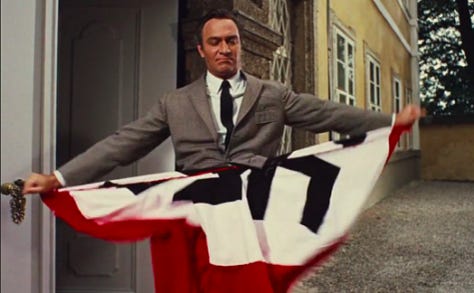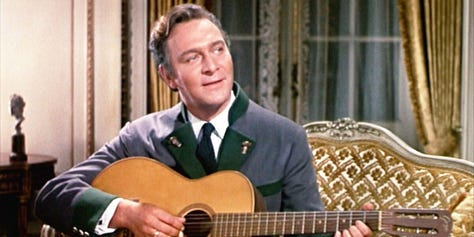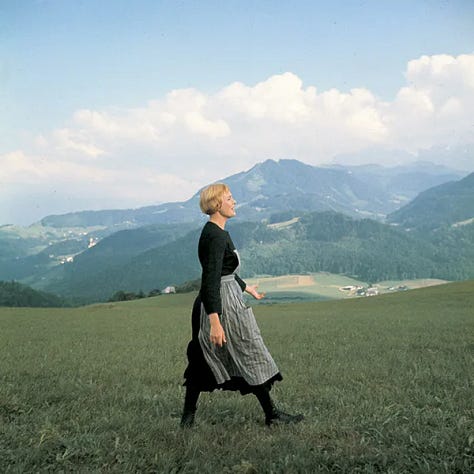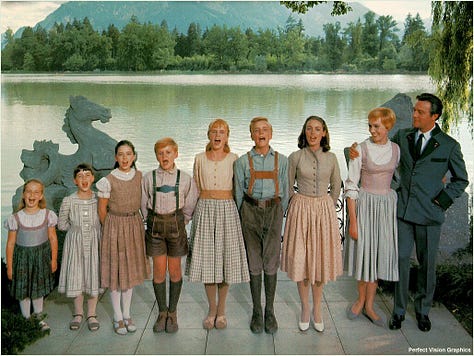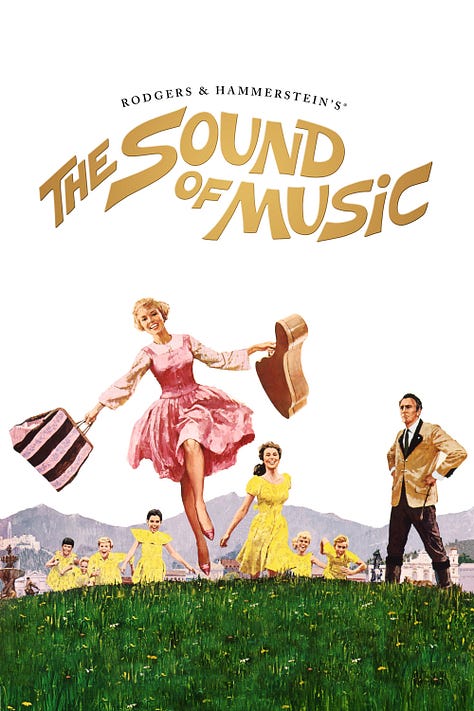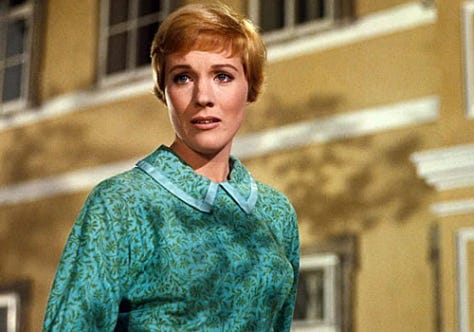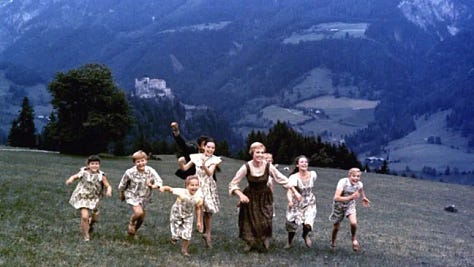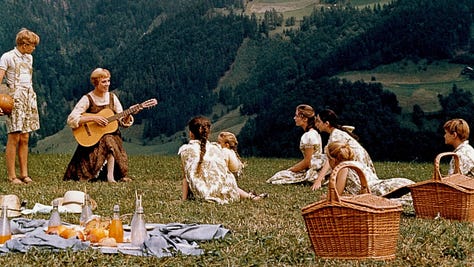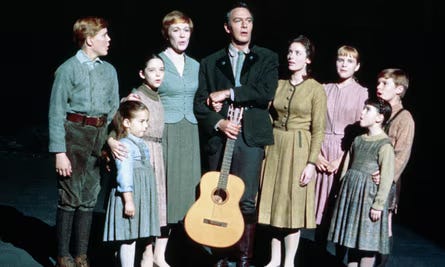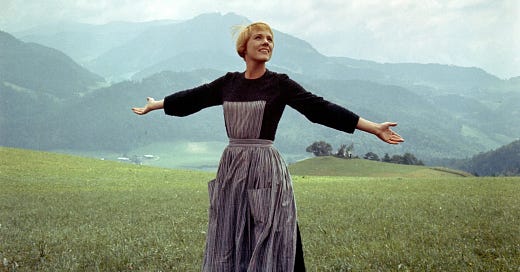THE SOUND OF MUSIC
1965 • Robert WiseCast: Julie Andrews, Christopher Plummer, Richard Haydn, Peggy Wood, Charmian Carr, Eleanor Parker, Heather Menzies, Nicholas Hammond, Duane Chase, Angela Cartwright, Marni Nixon
Screenplay: Ernest Lehman; Based on The Sound of Music by Howard Lindsay and Russel Crouse; The Story of the Trapp Family Singers by Maria von Trapp
Cinematography: Ted D. McCord
Music: Richard Rodgers, Oscar Hammerstein II (lyrics), Irwin Kostal (score)
Producer: Robert Wise
20th Century-Fox
Fraulein, were you this much trouble at the Abbey?
Oh, much more, sir.
With the holidays now in full swing, let’s look at another holiday family favorite, even if it has nothing to do with the holidays. Starting off with a famous and glorious shot in the Austrian Alps, The Sound of Music follows as Maria, a spirited young nun-in-training, is sent to be the governess for the seven children of Captain Georg von Trapp, a widowed naval officer in Austria. Maria's infectious love for music and warmth gradually thaw the icy exterior of the von Trapp household, bringing joy and harmony through iconic songs like "Do-Re-Mi" and "My Favorite Things." Amid the musical interludes, a tender romance blossoms between Maria and Captain von Trapp, complicating their roles and relationships. The von Trapp family's newfound happiness is overshadowed by the dark clouds of the Nazi regime threatening their beloved Austria.
The Sound of Music is undeniably on the sweet side. After all, even Christopher Plummer called it “The Sound of Mucus” for a time as he was embarrassed by it. (Much like Georg, he eventually came around and was less grumpy about it.) It is a joyful film musical that serves as a testament to the uplifting power of love and music. Julie Andrews, as Maria, infuses the film with an infectious sweetness, using her character's boundless enthusiasm to bring life and melody to the von Trapp household. Yet, this saccharine quality is expertly balanced by the commanding presence of Plummer as Captain Georg von Trapp. His stern demeanor provides the necessary counterweight. The film's story unfolds in two distinct halves. The first, a celebration of love and music, showcases the transformative impact of Maria's arrival on the von Trapp family. The hills are alive with the sound of music, and the joyous melodies become the heartbeat of the film. Maybe that’s too much for some. Maybe it’s too much sweetness and sunshine. However, as the plot progresses, a darker undertone emerges with the encroaching threat of the Nazi regime. The second half confronts a stark reality. The Sound of Music is a testament to the belief that, in the darkest moments, it is the warmth of love and the universal language of music that can dispel shadows. The sweetness isn't merely an indulgence; it becomes a deliberate choice to emphasize the resilience of the human spirit. The message is clear: in a world threatened by darkness, love must endure.
While the film extends nearly three hours in duration, it is rich with iconic songs by Rodgers & Hammerstein. Among the standout songs and maybe the most famous is "Do-Re-Mi", a whimsical journey through the musical scale as Maria introduces the von Trapp children to the world of music. I feel like if you grew up in the American education system, this song was taught to an entire generation of Gen Xers and Millenials at the age of 7. Another unforgettable piece is "My Favorite Things," where Maria uses the power of positive thinking to comfort the children during a thunderstorm, listing delightful items to focus on instead of fears. It has since become a Christmas standard, which doesn’t make sense since it’s not about Christmas, but it’s a pretty song nonetheless. The titular song, "The Sound of Music," captures the essence of the film, serving as an expression of Maria's love for the power of music itself. "Edelweiss," is a song of love for one's homeland that takes on added poignancy as the von Trapp family faces the threat of the Nazi regime.
Julie Andrews's Oscar-nominated performance encapsulates the essence of her extraordinary talent. As the warm-hearted Maria, Andrews brings a magnetic energy to the screen, infusing the character with a perfect blend of youthful exuberance and genuine compassion. Andrews's ability to convey Maria's journey from a free-spirited governess to the linchpin of the von Trapp family is captivating. The depth of her performance lies not only in the moments of joy and musicality but also in the nuanced emotions she conveys as she is falling in love with the Captain and during the darker turns of the narrative as the looming threat of the Nazi regime unfolds. Julie Andrews is also one of the most enchanting and powerful voices ever. Her vocal prowess is showcased in the film's memorable musical numbers, each note resonating with emotion. Andrews's voice becomes the soulful heartbeat of the film, elevating each musical number to a level of unparalleled beauty. Whether she's leading the von Trapp children through the hills in the exuberant "Do-Re-Mi" or delivering the heartfelt and iconic "My Favorite Things," Andrews's voice is a marvel. Beyond technical excellence (which I can’t really speak about since I don’t know how to write about music) her singing captures the very essence of the character, expressing joy, love, and resilience in the face of adversity.
Christopher Plummer delivers a nuanced performance, transitioning seamlessly between seriousness and genuine enjoyment. Initially portraying Captain Georg von Trapp with sternness and inflexibility, Plummer skillfully captures the transformation of a character burdened by grief into the loving father that the children once knew. His evolution is heartwarming. When he confesses to Maria “You brought music back into the house, I had forgotten” it resonates heavily. (If you don’t get somewhat emotional at that line, you’re a dirty liar.) Yet, Plummer's portrayal is not just about tenderness; it also encompasses the strength of a principled man faced with the encroaching darkness of the Nazi regime. In a defining hero moment, Captain von Trapp defiantly rips down a Nazi flag, tearing it in half with resolute determination. This symbolic act not only underscores his unwavering commitment to his principles but also becomes a powerful cinematic moment, resonating with audiences as a stand against oppression. Plummer's multifaceted performance, marked by both vulnerability and strength, contributes significantly to the film's depth and emotional impact.
In a world often filled with complexity and challenges, The Sound of Music offers a welcome escape, inviting viewers to immerse themselves in the enchanting world of the von Trapp family and the power of music and love. In its celebration of music, love, and resilience, the film serves as a reminder of the enduring capacity of the human spirit to overcome adversity. The film's enduring popularity attests to its ability to provide a sense of comfort and inspiration, making it a timeless classic. Sometimes there's a genuine and essential need for cinematic experiences that are, at their core, unapologetically joyous.
You brought music back into the house. I had forgotten.
Notable Accomplishments
Highest Grossing Film of All Time at time of release
5 Academy Award Wins including Best Picture, Best Director
2 Golden Globe Wins for Best Picture and Best Actress
Streaming: Disney+
Digital Rental/Purchase: Available at major digital retailers
Physical Media: Available on Blu-Ray and DVD.
